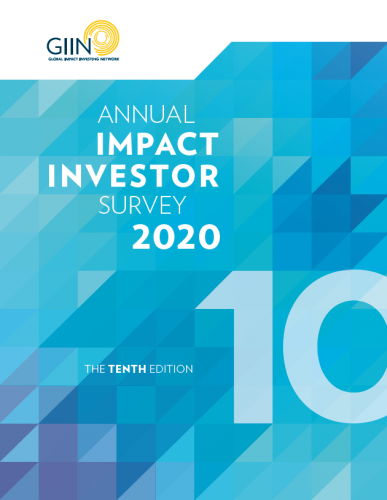CFC joins the most comprehensive survey from the impact investing sector
The Common Fund for Commodities has joined the collaborative effort by Global Impact Investing Network (GIIN) in preparing its 2020 Annual Impact Investor Survey that has just been released. The report features data and insights from 294 leading impact investors, including the CFC, and estimates the current size of the impact investing market at around USD 715 billion. Respondents shared their investment activity for the year ending 2019 and their plans for 2020, their reflections on developments over the past decade, and their views of future challenges facing the market. Understanding the need for more data for the impact investing sector, the CFC gave its contribution for the report, sharing all the necessary information.
The main findings of the survey include:
The impact investing remains diverse: Hailing from 46 countries, respondents are headquartered in both developed markets (DM, 77%) and in emerging markets (EM, 21%). In terms of the geographic allocation of assets, 48% of respondents invest primarily in DMs while 43% are focused on investing in EMs. While food and agriculture accounts for a relatively small proportion of AUM (9% excluding outliers), it is the most common sector for investment, with 57% of respondents having some allocation and the highest proportion of respondents (54%) planning to increase their allocations over the next five years. Healthcare is another common sector, with almost half of respondents having some allocation to healthcare.
Impact investing has grown in depth and sophistication over time: A clear majority of respondents consider the impact investing market to be ‘growing steadily’ (69%) with 21% describing the market as ‘about to take off.’ Notably, no respondents see the impact investing market ‘declining.’
Impact measurement and management (IMM) practices have matured, but opportunities for refinement remain: There is broad use of the SDGs with 73% using this framework for at least one measurement and management purpose. On average, respondents target eight different SDG-aligned impact themes, reflecting the diversity of their impact goals. Coalescence around the SDGs in particular, as well as IRIS, IRIS+, and the IMP, has meant that approaches to IMM are now becoming more standardized. Compared to when they first started making impact investments, 88% of respondents believe they have increased the rigor of their IMM practices. Nevertheless, impact investors describe a range of challenges they expect to face over the next five years that could be addressed by further development of IMM practices.
Impact investors hold a positive outlook for the future despite headwinds: Most respondents (57%) indicated that they are ‘unlikely’ to change the volume of capital they had planned to commit to impact investments in 2020, despite the outbreak of the Covid-19. Respondents’ narrative comments suggest that, in general, impact investors are responding to this crisis with flexibility and resolve. They are mitigating the potential for defaults by renegotiating loan terms, investing more funds to support their investments, and exercising patience to still realize their performance expectations over the longer term. Some further comment that, especially at this time, impact investors are well-placed to support the underserved, recognizing the extent to which marginalized communities are most negatively affected by the COVID-19 pandemic.
The full report, with interesting information on the last trends from the sector can be found at: https://bit.ly/3cQSMIg” Annual Impact Investor 2020
The Common Fund for Commodities (CFC) is an autonomous intergovernmental financial institution, dedicated to impact investing, established within the framework of the United Nations. It was founded on the principles of equitable distribution of economic, social and environmental benefits from commodity production, processing and trade, serving the long-term interests of both Developed and Developing countries. In particular the CFC aspires that production, processing and trade of commodities benefits producers and consumers alike so that commodity sectors contribute to the development of society as a whole.
Towards this goal, the Fund provides financial support for innovative projects with high impact promoting the interests of the small holder farmers and small and medium enterprises (SMEs) engaged in commodity production, processing and trading in Developing Countries.
Mission: “To contribute to poverty alleviation by strengthening the income-generating capacity of commodity producers and mitigating vulnerability to their economic well being”
Vision: “To strengthen and diversify the commodity sector in developing countries and transform it to be a major contributor to poverty alleviation and sustained economic growth and development.”

